fridge, v. to kill off a female character solely for the purpose of giving the story's main male hero a reason to angst. Coined by Gail Simone in response to a storyline in The Green Lantern in which the hero's girlfriend is killed and literally stuffed in his refrigerator. In 1999, Simone started a website, Women in Refrigerators, that lists all of the comic book women who have been fridged.
Unless you've been living under a rock lately, you've heard of director Christopher Nolan's new movie Inception. It's a long-generating story, one that he's been working on for over a decade, biding his time and building up enough of a reputation in Hollywood that he could get the backing for his dazzling mindfuck of a pet project.
And build up a reputation he has: Nolan has had a string of hits, both financially and critically. On the review-aggregating site Rotten Tomatoes, not one of his films rates below a 75%. His last movie, The Dark Knight, grossed over 1 billion dollars worldwide. There are precious few filmmakers in Hollywood who have so successfully balanced artistic achievements with the culture of spectacle, not so much infusing blockbusters with a decent story as crafting intricate scripts that just so happen to have blockbuster potential.
It's a goddamn shame, then, that he feels the need to fridge the hell out of his women.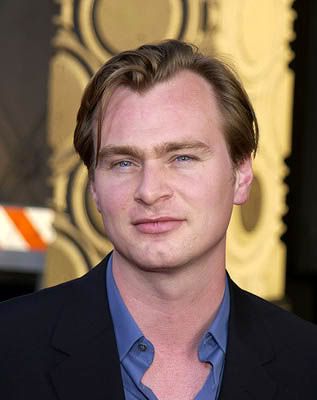
In case you haven't figured it out by now, THIS POST CONTAINS MAJOR SPOILERS FOR ALMOST EVERY CHRISTOPHER NOLAN MOVIE EVER MADE. Also, I am not a scientist or a professional researcher.
Don't get me wrong: I love Christopher Nolan's movies. Memento is one of my favorites. I own The Dark Knight. Next week I will see Inception for the third time in theaters. But there's always a lingering icky feeling after the credits roll, when I watch the actors' names rise from the bottom of the screen and try to remember whether any of the women listed did anything important other than die. More often than not, the answer is a resounding no. And when they do live, they're usually evil.
Don't believe me? Let's have a look.
CASE STUDY: Memento (2000)
The movie that made us all sit up and go, "Christopher WHO?" A crackerjack film noir told in reverse about an amnesiac named Leonard (Guy Pearce) who's looking for the man who killed his wife...or is he?
The women: Natalie (Carrie-Ann Moss). A bartender who Leonard meets on his search through the underbelly. By turns helpful and treacherous, Natalie ultimately manipulates Leonard for her own purposes, using his disability to kill off or maim those who are threatening her. She's undeniably shady, but just how bad she is depends on your interpretation of the movie's events. Alive, antagonist.
Natalie (Carrie-Ann Moss). A bartender who Leonard meets on his search through the underbelly. By turns helpful and treacherous, Natalie ultimately manipulates Leonard for her own purposes, using his disability to kill off or maim those who are threatening her. She's undeniably shady, but just how bad she is depends on your interpretation of the movie's events. Alive, antagonist.
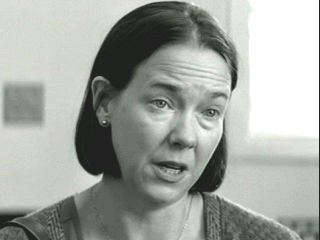 Mrs. Jankis (Harriet Sansom Harris). Apparently she has no first name. Leonard repeats the story of the Jankis' several times: Sammy Jankis has the same brain damage as Leonard, but his wife doubts whether or not he's faking it, so she decides to test him. She asks him to give her an insulin shot, then another one in a few minutes after his memory has erased the first. Surprise, surprise, he wasn't faking, and she dies. This is the first instance of a wife dying due to her husband's actions. Dead.
Mrs. Jankis (Harriet Sansom Harris). Apparently she has no first name. Leonard repeats the story of the Jankis' several times: Sammy Jankis has the same brain damage as Leonard, but his wife doubts whether or not he's faking it, so she decides to test him. She asks him to give her an insulin shot, then another one in a few minutes after his memory has erased the first. Surprise, surprise, he wasn't faking, and she dies. This is the first instance of a wife dying due to her husband's actions. Dead.
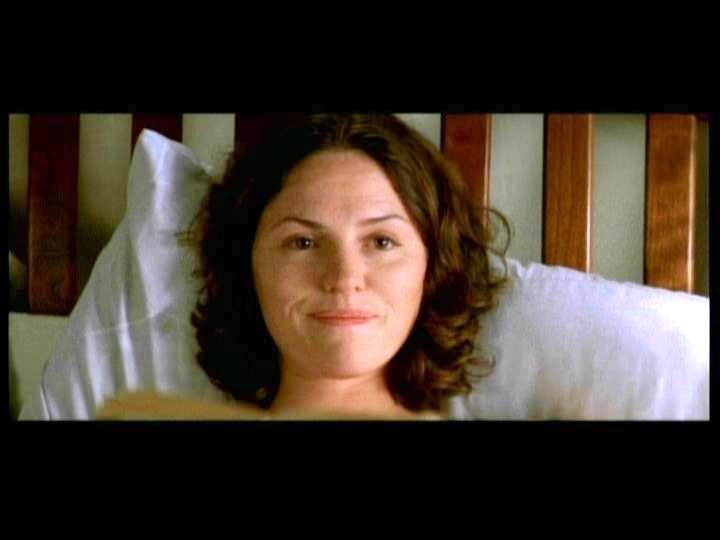 Leonard's Wife (Jorja Fox). No, seriously, Leonard's Wife is her official credit. She didn't get a fucking name either. Oy. Anyway, she actually sort of dies twice in the movie, once when she and Leonard are first attacked; she survives the attack, but Leonard doesn't remember that, and the loss drives him through most of the film. It's revealed at the end, though, that she was actually the one with the insulin, and Leonard invented Sammy Jankis and his wife in order not to deal with the guilt. So really we get two dead-because-of-her-husband-wives for the price of one. Dead.
Leonard's Wife (Jorja Fox). No, seriously, Leonard's Wife is her official credit. She didn't get a fucking name either. Oy. Anyway, she actually sort of dies twice in the movie, once when she and Leonard are first attacked; she survives the attack, but Leonard doesn't remember that, and the loss drives him through most of the film. It's revealed at the end, though, that she was actually the one with the insulin, and Leonard invented Sammy Jankis and his wife in order not to deal with the guilt. So really we get two dead-because-of-her-husband-wives for the price of one. Dead.CONCLUSIONS: Two dead, unnamed wives inadvertantly killed by their husbands' conditions; one femme fatale. We're off to a bangup start. Movie also fails the Bechdel Test: at no point in the movie do two women even speak to each other.
The Bechdel Test: a litmus test developed by writer Alison Bechdel in 1985 to gauge the agency and autonomy of a story's characters. The test has three parts: 1) Are there two female characters who 2) talk to each other 3) about something other than a man?
CASE STUDY: Insomnia (2002)
Detective Frank Dormer (Al Pacino) hunts for serial killer Walter Finch (Robin Williams) in Alaska with the assistance of a local cop named Ellie Burr (Hilary Swank). After he accidentally shoots his partner and covers it up, though, he and the killer wind up morally entangled, and Ellie gets suspicious.
The women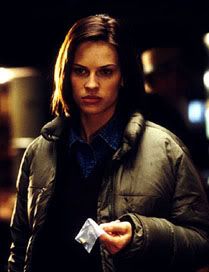 Ellie Burr (Hilary Swank). Here's a good one: Burr practically salivates over Dormer at the film's outset, telling him that he's her idol, but she's also the only one sharp enough to catch the mistakes that Dormer made in his cover-up. Despite getting no backup from the rest of the local cops, who call her "Nancy Drew," she solves the mystery on her own and is the only one left standing as the credits roll. Technically she's an antagonist for the main character, but she's a principled one with plenty of agency. Alive, antagonist.
Ellie Burr (Hilary Swank). Here's a good one: Burr practically salivates over Dormer at the film's outset, telling him that he's her idol, but she's also the only one sharp enough to catch the mistakes that Dormer made in his cover-up. Despite getting no backup from the rest of the local cops, who call her "Nancy Drew," she solves the mystery on her own and is the only one left standing as the credits roll. Technically she's an antagonist for the main character, but she's a principled one with plenty of agency. Alive, antagonist.
Kay Connell (Crystal Lowe). Every serial killer story needs a naked, beaten female victim, and teenaged Kay Connell fits the bill. She's already dead before the opening credits, so we only glimpse her in flashbacks and as a bloated corpse on a morgue slab. (I couldn't find any pictures of her that weren't naked and mutilated, so I didn't put one up.) Dead.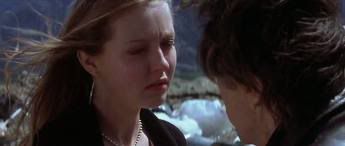 Tanya (Katherine Isabelle). Kay's "best friend," who was sleeping with Kay's boyfriend. Portrayed as a callow Lolita who comes onto Dormer and doesn't really care about her dead friend. Alive, but a Whore.
Tanya (Katherine Isabelle). Kay's "best friend," who was sleeping with Kay's boyfriend. Portrayed as a callow Lolita who comes onto Dormer and doesn't really care about her dead friend. Alive, but a Whore.
Madonna-Whore complex: a psychological condition in which men divide women into ultra-"pure" Madonnas who can never be sullied with sexual intimacy, and dirty, dirty Whores who can never possibly be wives or mothers. As in men's minds, so in culture. For example: every single Taylor Swift video, ever.
 The hotel manager (Maura Tierney). According to IMDB, she's "Rachel Clements," but I don't recall her ever being called by her name in the film. She's shown to be hard-working and professional, but is also deeply compassionate. When the sleepless Dormer is coming unglued, she listens to his desperate confession and advises him. This is the first instance of another motif in Nolan's films: women acting as the conscience of men. Which, hey, it's still using a woman as a secondary prop to a man's emotional arc, but at least she isn't evil. Alive, good.
The hotel manager (Maura Tierney). According to IMDB, she's "Rachel Clements," but I don't recall her ever being called by her name in the film. She's shown to be hard-working and professional, but is also deeply compassionate. When the sleepless Dormer is coming unglued, she listens to his desperate confession and advises him. This is the first instance of another motif in Nolan's films: women acting as the conscience of men. Which, hey, it's still using a woman as a secondary prop to a man's emotional arc, but at least she isn't evil. Alive, good.
CONCLUSIONS: Not so bad. We have two strong, principled, professional women, though one of them is technically an antagonist. We've also got a dead, mutilated teenager and a Whore, but...it kinda balances out? No on the Bechdel Test: no two women speak to each other through the whole movie.
CASE STUDY: Batman Begins (2005)
Taking over the Batman franchise, Nolan took him back to his roots for an origin story, detailing how Bruce Wayne trained himself into a crime-busting machine.
The women woman Rachel Dawes (Katie Holmes). As the one woman in Batman Begins, Rachel is brave and smart. As the only ADA with the figurative nads to stand up to the crime syndicate, she's an invaluable ally to Batman and Jim Gordon. She's also another "conscience woman," directing Bruce away from vengeance after his parents are gunned down. (Which, by the way, isn't it funny how much Bruce flashes back to his dead father? While never seeming to give a thought to his dead mother? Yes, I thought that was funny, too.) Rachel does need to be saved an awful lot. Alive, good.
Rachel Dawes (Katie Holmes). As the one woman in Batman Begins, Rachel is brave and smart. As the only ADA with the figurative nads to stand up to the crime syndicate, she's an invaluable ally to Batman and Jim Gordon. She's also another "conscience woman," directing Bruce away from vengeance after his parents are gunned down. (Which, by the way, isn't it funny how much Bruce flashes back to his dead father? While never seeming to give a thought to his dead mother? Yes, I thought that was funny, too.) Rachel does need to be saved an awful lot. Alive, good.
CONCLUSIONS: No chance at the Bechdel test, but Rachel is still a fairly good female character...
CASE STUDY: The Dark Knight
Nolan's second entry in his revival of the Batman movies.
The women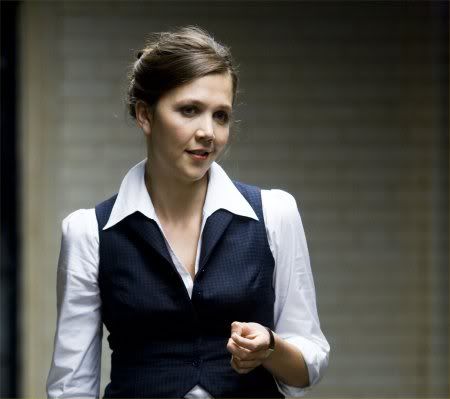 Rachel Dawes (Maggie Gyllenhaal): ...d'oh! Now, obviously the Batman franchise is based on pre-existing material, so Nolan can't 100% be blamed for this one. But still, every comic book director picks and chooses which canon to use from the books, and this is what Nolan chose. (God help us if he ever tries his hand at Catwoman.) ETA: I've been informed in the comments that Rachel Dawes was NOT in the comics and that her movie character was not based on any recognizable pre-existing Batman character. So Nolan created a woman and introduced her into the Batman universe solely for the purpose of killing her off. Not only does her death provide angst for Bruce Wayne, it turns Harvey Dent evil and Jim Gordon borderline-suicidal. Wow, screw fridging, that's like a deep freeze! Dead.
Rachel Dawes (Maggie Gyllenhaal): ...d'oh! Now, obviously the Batman franchise is based on pre-existing material, so Nolan can't 100% be blamed for this one. But still, every comic book director picks and chooses which canon to use from the books, and this is what Nolan chose. (God help us if he ever tries his hand at Catwoman.) ETA: I've been informed in the comments that Rachel Dawes was NOT in the comics and that her movie character was not based on any recognizable pre-existing Batman character. So Nolan created a woman and introduced her into the Batman universe solely for the purpose of killing her off. Not only does her death provide angst for Bruce Wayne, it turns Harvey Dent evil and Jim Gordon borderline-suicidal. Wow, screw fridging, that's like a deep freeze! Dead. Detective Andrea Ramirez (Monique Gabriela Curnen): Shown to be Jim Gordon's strong right hand, despite the fact that she's a rookie. She ultimately betrays them all to the crime syndicate, gets Rachel killed, and almost gets Jim Gordon's family killed. Alive, antagonist.
Detective Andrea Ramirez (Monique Gabriela Curnen): Shown to be Jim Gordon's strong right hand, despite the fact that she's a rookie. She ultimately betrays them all to the crime syndicate, gets Rachel killed, and almost gets Jim Gordon's family killed. Alive, antagonist.
Barbara Gordon (Melinda McGraw): Exists in the movie solely to be Gordon's wife, mother of his children, and a Madonna. The only time she's ever seen outside their home is when she and her children are taken hostage by Two-Face; she puts up absolutely no fight even when the dude has a gun to her son's head. (And while we're on the subject of Gordon's family: Gordon's son is "Jim Gordon, Jr." but guess what his daughter's credited as? "Jim Gordon's Daughter." That's right, she gets no name, and it's made explicit in the movie that she's not her father's favorite. Nice.) Alive, but a Madonna.
ETA: I totally forgot about Judge Surrilo! You know, the female judge who was willing to preside over Dent's prosecution of all the mobsters at once. You know--the one who gets blown up. Yeah, that one. Dead.
CONCLUSIONS: All the women are either dead, evil, or a Madonna. The film sort of passes the Bechdel test in that Ramirez calls Barbara Gordon to warn her that she should leave the house; but that's done at Two-face's gunpoint, so it's sketchy at best. Apparently the only way to get women to talk to each other in Nolan movies is to point a gun at them.
CASE STUDY: The Prestige
Two rival magicians, Angier (Hugh Jackman) and Borden (Christian Bale), duke it out in turn-of-the-century England.
The women
Julia (Piper Perabo). Angier's wife. Drowns--half-naked and bound, onstage--during a botched magic trick; the messup was possibly Borden's fault, and her death incites the antipathy between the two. The manner of her death is of some importance: there's a strong undercurrent through the movie about the sacrifices that magicians make for their craft, and it's understood that women are a necessary sacrifice. See below. Dead. Sarah (Rebecca Hall). Borden's wife. Hangs herself in despair because of what she believes is her husband's fickle nature and unfaithfulness. What she doesn't realize is that she's actually married one of two twin brothers; they never tell anyone the truth because it would mean exposing their best magic trick. So basically Borden watches his wife sink into depression and alcohol abuse rather than tell her the truth, all for the sake of his career. Lovely. Dead.
Sarah (Rebecca Hall). Borden's wife. Hangs herself in despair because of what she believes is her husband's fickle nature and unfaithfulness. What she doesn't realize is that she's actually married one of two twin brothers; they never tell anyone the truth because it would mean exposing their best magic trick. So basically Borden watches his wife sink into depression and alcohol abuse rather than tell her the truth, all for the sake of his career. Lovely. Dead.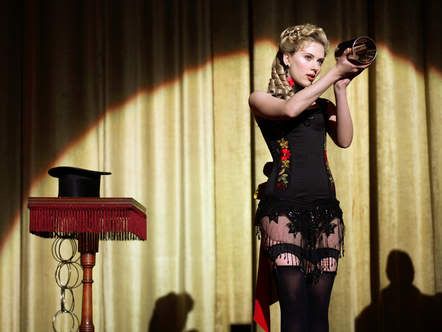 Olivia (Scarlett Johansson). She is first Angier's assistant; Angier sends her to spy on and sleep with Borden, and she switches sides in disgust. She's a good accomplice, particularly for Borden who she helps revolutionize his career. They fall in love, but she also becomes disgusted by his fickleness. Again, the twins can't be bothered to tell her the truth. Despite being traded like a pawn between the men, she has a fair amount of agency and independence. One could argue that she's a Whore, but given her sympathy for the dead Sarah and her decision to leave Borden, I think that she avoids that trap. Alive, good.
Olivia (Scarlett Johansson). She is first Angier's assistant; Angier sends her to spy on and sleep with Borden, and she switches sides in disgust. She's a good accomplice, particularly for Borden who she helps revolutionize his career. They fall in love, but she also becomes disgusted by his fickleness. Again, the twins can't be bothered to tell her the truth. Despite being traded like a pawn between the men, she has a fair amount of agency and independence. One could argue that she's a Whore, but given her sympathy for the dead Sarah and her decision to leave Borden, I think that she avoids that trap. Alive, good.
CONCLUSIONS: Two dead wives, twice the manpain. (Or well, triple, if you count the twins separately.) This story, too, was an adaptation; but, again, Nolan chose to take this project on. Something about dead wives really appeals to him. Sarah and Olivia do speak to each other once, but only so that Sarah can object to Olivia calling her husband "Freddie," so it's definitely about a man.
CASE STUDY: Inception, 2010
A team of extractors led by Dom Cobb (Leonardo Dicaprio) invades the mind of an energy magnate, but they're dogged by a shade from Cobb's past, Mal (Marion Cotillard).
The women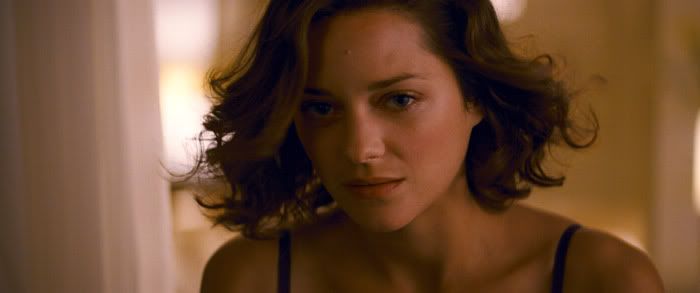 Mal. Let's get the obvious one out of the way: the dead wife. And not only is she dead, we actually see her die four times over, both in dreams and in real life. Twice are suicide, once she's shot by her husband, and once she's shot by the movie's other woman. Her madness and eventual real-life suicide were her husband's fault. After her death she haunts his subconscious and is the film's femme fatale and villain. Plus, most of the time she's she's not even real. Besides the few flashbacks where she's crazy and suicidal, she spends most of the movie as a goddamn projection of Cobb's memory of her, laced with his guilt and self-loathing. She has absolutely no autonomy of her own. It's like Chris Nolan's worst hits, all wrapped up in one admittedly-gorgeous Frenchwoman. Very dead, antagonist.
Mal. Let's get the obvious one out of the way: the dead wife. And not only is she dead, we actually see her die four times over, both in dreams and in real life. Twice are suicide, once she's shot by her husband, and once she's shot by the movie's other woman. Her madness and eventual real-life suicide were her husband's fault. After her death she haunts his subconscious and is the film's femme fatale and villain. Plus, most of the time she's she's not even real. Besides the few flashbacks where she's crazy and suicidal, she spends most of the movie as a goddamn projection of Cobb's memory of her, laced with his guilt and self-loathing. She has absolutely no autonomy of her own. It's like Chris Nolan's worst hits, all wrapped up in one admittedly-gorgeous Frenchwoman. Very dead, antagonist.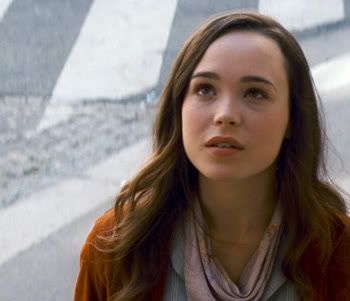 Ariadne (Ellen Page). Curiously, the film that has the worst representation of women also has the best female character that Nolan can offer to date. Ariadne is described as an ever better architect than Cobb was, she's the only teammember who calls him on his emotionally-disturbed shit, yet she is a constant support and guide for him. She's the supreme example of woman-as-conscience, persistently pushing Cobb to face his demons. Ultimately she's the one who completes the job they were hired to do, by shooting shade-Mal and literally drop-kicking Fischer out of Limbo. As the newest teammember, she's a stand-in for the audience, asking all the questions we're wondering; though Cobb is the main character, we're meant to identify with level-headed Ariadne. However, she is still a prop to Cobb's emotional and physical journey. We do see her "die" at one point, stabbed by Mal no less. On the scale of Christopher Nolan movies, she's pretty damn good, but he's still got a long way to go. Alive.
Ariadne (Ellen Page). Curiously, the film that has the worst representation of women also has the best female character that Nolan can offer to date. Ariadne is described as an ever better architect than Cobb was, she's the only teammember who calls him on his emotionally-disturbed shit, yet she is a constant support and guide for him. She's the supreme example of woman-as-conscience, persistently pushing Cobb to face his demons. Ultimately she's the one who completes the job they were hired to do, by shooting shade-Mal and literally drop-kicking Fischer out of Limbo. As the newest teammember, she's a stand-in for the audience, asking all the questions we're wondering; though Cobb is the main character, we're meant to identify with level-headed Ariadne. However, she is still a prop to Cobb's emotional and physical journey. We do see her "die" at one point, stabbed by Mal no less. On the scale of Christopher Nolan movies, she's pretty damn good, but he's still got a long way to go. Alive.
CONCLUSIONS: A decidedly mixed bag. The very best and worst, packed into one. It also comes closest to passing the Bechdel test: Ariadne and Mal talk, but Mal is technically a projection of Cobb's mind and their conversation was subtextually about Cobb. So it's debatable.
SUMMARY OF FINDINGS.
+ Going through the IMDB database, I counted up the number of named characters in the above movies. (Although as we've seen, "named" is a fairly relative term -- "Gordon's Daughter" and "Leonard's Wife," for example.) There were 94 names roles for all of Nolan's major films. (I'll confess I haven't seen Following or Doodlebug. If someone has, please chime in.) (ETA: Somebody did chime in! Ryan Meray reports: "In Following, the only woman in the film dies. Also fails the Bechdel test.") Even being generous with what constitutes a name, only 23 of those roles belonged to women.
+ Of those 23, only 17 had speaking roles (more than one line).
+ Of those 17, only 9 were alive at the end of the movie.
+ Of those 9, 5 were antagonists, Whores, or Madonnas.
+ That just leaves the hotel manager in Insomnia (who apparently has a name -- I was generous there), Rachel Dawes in Batman Begins, Olivia in The Prestige, and Ariadne in Inception. One of them dies in a later film, and one "dies" in a dream, one is almost a Whore, and one barely has a name.
+ Of the 6 women who are wives in Chris Nolan movies, only Barbara Gordon survives her movie. Of the other 5, 4 commit suicide.
+ Of the 8 women who die, 6 are inarguably cases of fridging. Remember, "fridging" means killing a woman off solely to give the main male hero a reason to angst. The two wives in Memento match this profile to a T, as do the two wives in The Prestige, Mal in Inception, and Rachel Dawes in The Dark Knight.
But fridging is obviously only part of a larger problem in Nolan's cinescape. Recent studies have shown that women get only about 30% of the speaking roles in films and tv shows, despite making up half the population. In Nolan movies, only 23% of the named roles are women. I haven't the wherewithal to examine the percentage of speaking roles that belong to women, but I'm guessing that it's not many.
Again, let me be clear that I am a fan of Nolan. I belive he's a visionary. But speaking as a woman who watches his movies, I find myself longing to see someone like me onscreen, who doesn't die horribly. I want to believe that he is better than this. I want to believe that he just hasn't been challenged on it yet.
Consider this your gauntlet, Mr. Nolan.
...It's a little disappointing that I'm not more surprised. But this is an excellent write up. You definitely did your homework.
ReplyDeleteI must note that I suspect the reason they don't name Gordon's daughter in The Dark Knight is because they were wary of that - Gordon's daughter is Barbara Gordon, later to be Batgirl and Nolan has made it clear that Robin and Batgirl aren't going to appear in the films, so doubtlessly he was trying to avoid speculation.
ReplyDeleteI am a little appalled by the truth of this, though certainly in at least one case (The Prestige) you can blame the source material. Excellent write-up of this - it is something I noticed in passing but had not looked deeply into.
Wow. I have suspected this about Nolan ever since The Dark Knight came out. 'Another fridge?' was my knee-jerk reaction to Inception, even before 'man, I loved that movie'. And here, you have explained the exact thing I have been arguing/debating my feminist friends about. Thank you- I will be linking to this. You lay the objection out so clearly and concisely.
ReplyDeleteI'm not too familiar with Nolan's works, but I've heard about his tendency to fridge the ladies from AJ.
ReplyDelete(i think it's notable that insomnia is also an adaptation, though i never saw the original.)
ReplyDeletewhile i liked ariadne, i think her usefulness in terms of well-rounded not-there-for-the-menfolk's-mainpain lady characters is pretty much...nonexistent. she is there pretty much solely to explain the cobb's manpain and to reiterate it repeatedly to the audience; as one commentary on inception put it, she's a cipher (in the sense that she is the audience's key to understanding the movie--arguably unnecessary in that role, as hello, a character who can show up and kill everyone at any moment is obviously not a good idea to have around).
so i guess i'm debating with you a little bit as to whether she's "the very best." she's cute and interesting and smart and likable, but her role within most of the film is so clearly defined by cobb and cobb's needs (and, i guess, the filmmakers' assumptions about the audience's needs) that i can't see her as a great leap forward for c. nolan's ability to write women.
(it doesn't help that half the time when she was poking around with cobb i was thinking, dude, WHO DOES THIS. it felt like amateur, forced storytelling: the audience must know about crazypants mal, so we'll have ariadne go to the basement! that's part of the reason cobb's mainpain as a major function of the plot annoyed me so much, i think.)
IN OTHER NEWS: this post is epic and you are amazing. :D
Rachel Dawes, as far as I know, was created for Batman Begins, so Nolan doesn't even have canon to hide behind there.
ReplyDeleteThat's pretty dang awesome. I'm going to have to dwell on this for a bit, but it seems to hit on the major issues I have with Nolan films (though otherwise they're generally awesome).
ReplyDeletechilde-strife: I wish you could see my desk, I have little scribbled notes everywhere. At one point there might have been pie charts.
ReplyDeleteI was a little surprised at just how pervasive the issue was. I knew he had problems...but to see almost every wife die was a bit of a shock. Dudes got some problems there.
alexthegreat: But they surely could have named her something else. Like, she didn't get any lines but it would have been nice for her to exist in some capacity. As it was, she seemed like a mannequin child, just there to fill space.
ReplyDeleteiamsupernova: Oh definitely, AJ and I had chatted about this via email before I started writing. I should link to his post...
ReplyDeletethe elfie: Oh, I didn't mean at all to give the impression I though Ariadne was a great female character. You're right, for most of the movie her only purpose is to give Cobb a reason to exposit about his manpain. On the scale of Chris Nolan movies, though, she was pretty damn good. (It's possible that at that point in the writeup, I'd spent all day writing about dead wives and Whores, and was a bit over-enthusiastic to find a character who was neither.) I've tweaked that section a bit to make it clearer.
ReplyDeleteRenegadesidhe: Seriously? I had assumed that he got her or based her somehow on a pre-existing woman from Batman! If she was original to the movies, then yeah, that's doubly on him.
ReplyDeleteintelligirl: That's the hard part, is that I LOVE his movies outside of this issue. They're so different and exciting and this...this is just lazy. It's a lazy, cheap trick to elicit sympathy for the male lead, and I can't understand why he keeps using it.
ReplyDeleteAwesome review and analysis! Nolan definitely deserves your gauntlet. He's so clever and original, and a great storyteller, but not super capable in the "female characters" department.
ReplyDeleteI think you're being generous in saying that Inception passes the Bechdel test; when Ariadne and Mal (no matter whether she's a projection or not) talk, it's basically about Cobb. :( I agree with the elfie that she exists primarily to exposit Cobb's manpain and articulate it to the audience. At the beginning, I was excited, because she seemed so able--being the best architect and all--but then all she *does* is serve as a blackboard, presenting diagrams of Cobb's motivations.
Thanks for this excellent write up!
This is probably the best rundown of this that I've seen thus far, interms of laying out all the information, so thanks for that!
ReplyDeleteI hadn't ever seen a Nolan movie outside of the Batman-verse until Inception, so the trend never caught my eye. Having seen so many people bring it up though I'll definitely be watching to see what happens with what he puts out next... Its sad to see someone make movies that are so enjoyable with such unpleasant components.
-K
prophetic: Yeah, I'm definitely not calling it a win on the Bechdel for Inception. I've seen some people argue that it passes, but really, Mal is nothing but a shade, Cobb's memory of his wife laced with plenty of guilt and self-loathing. Hell, they're in Cobb's BRAIN when Mal and Ariadne talk.
ReplyDeleteAnonymous: It makes me sadface to see him neglecting his female characters so. God, what I wouldn't give for a good Catwoman! Like, imagine that 18-wheeler set piece in TDK or the zero-g hotel fight in Inception, built around a FEMALE CHARACTER. I mean, HOLY SHIT, that would be awesome. So much potential! And he's wasting it!
ReplyDeleteI left the theater feeling inclined to be generous, after Cobb calls himself out on everyone else only seeing Mal as his projections. To me, it felt like Nolan's way of admitting that this woman was only an antagonist because the protagonist forced her to be, and that on the "reality" level of the movie, she was very different. I think that's something a lot of movies do to female characters without admitting it, or even being aware.
ReplyDeleteOn the other hand, we don't get any views of Mal without Cobb, and she was repeatedly fridged, so. *hands*
This comment has been removed by the author.
ReplyDeleteTo add spoilers and further support your theory - In Following, the only woman in the film dies. Also fails the Bechdel test. (fixed spelling)
ReplyDeleteRyan: Ahhhhh, good to know. Thank you!
ReplyDeleteI despise the tone of this article. Ms Mohr? I could tell your bias when reading it. Why are you picking on Nolan when your complaint should be a general sweep of a very large woman problem in Hollywood? I've got a number of massive issues with this article:
ReplyDelete1) Your complaint that Nolan's movies not passing the Bechedel Test: That test is complete bull and doesn't tell us anything. Why? Because Twilight, New Moon, and Eclipse pass the test, and those movies are the most anti-feminist pieces of junk that are around right now to date.
I have not seen all of Nolan's works. I wrote a massive response to this that the post wouldn't take, so I unfortunately had to cut it down. So I will only address my protests about the female characters in the movies I have seen:
The Dark Knight: You're being nitpicky and fussy with Barbara Gordon and the Judge. The Judge was a symbolic kill by the Joker that just HAPPENED to be a women. She was a blank role that could have easily been filled in by a man. And if the role was, you would have been complaining about it, right?
-A note on Inception: It's pretty much a Sci fi film to the core. Every single character was underdeveloped except for the protagonist, Cobb. That's also something that happens in a number of Nolan movies. (I've only read about the others). It's his crutch. That being said, Inception's main focus was on the canon laws of the dream world as a whole, the details, and all of the negatives that could go wrong - NOT character development.
4) You clearly didn't understand the sole reason for Mal being there in the first place. Or have you not seen the movie? Mal was titled "The Shade" for a reason. She WASN'T REAL. She was a terrifying shade of Cobb's subconscious that was incredibly symbolic for the movie. When asked about Mal, Arthur tells Ariadne, "She was lovely." A "lovely" woman is NOT a "femme fatale." The Mal we saw was a very, very dark part of Cobb that merely took the shape of Mal, nothing more. She's not a character - she's the representation of what can go wrong when playing with dreams. We NEVER saw the real Mal.
5) Ariadne - Are you familiar with another young woman by the same name in Greek mythology? If you are, then you'll be able to better understand her role in the film. And even as a character on her own, Ariadne was magnificent. She acted as Cobb's conscience because the audience needed her to. It's strongly implied that Arthur is the only other one that knows the depths of Cobb's issues, and for some reason, he doesn't call Cobb out on it. Ariadne catches onto the concepts quickly, and helps Cobb because of A) the alliteration in her name and B) to help detail what goes wrong in dreams, and how quickly the line can blur between dreams and reality.
You should be looking at the fact that Ariadne was hired because of her SKILL. The fact that she was a female wasn't even considered in the film by any of the characters at all! Everything was emphasized on her skill - and any negatives was because she was a rookie, but she proved herself in the end. She came as an individual with no extra baggage involving males. That's a pretty massive step forward in modern movies. In movies about women these days where if a woman has a meaty role, it's about a prostitute with a "heart of gold" or some girl finding her own way around "love," it was nice to see a female in a gritty film like this holding her own, with her gender not even being given a second thought to by her male co-workers. They saw her as her job: The architect.
If you wanted to write an article about director's women issues in Hollywood, you should have done a general sweep and included Nolan, not just single him out. I don't care if complaining about Michael Bay is redundant or akin to beating a dead horse - he should be mentioned anyway.
-Becca
Dear Ms. Becca (or just Becca? Whichever you prefer):
ReplyDeleteThank you for your comment. I will attempt to address all the points you raised.
-I'm unsure what bias you're accusing me of having. A feminist bias? Guilty. A bias against Nolan? Certainly not. As I mentioned twice in my post, I am a huge Christopher Nolan fan. I've seen Inception three times in theaters. I own The Dark Knight. I love Memento. The man's a visionary. That doesn't mean he's above reproach or critique. I think the things we love most are the exact things we should examine the closest. Just because I love Nolan's movies doesn't mean I shouldn't complain about his faults.
- You criticized my use of the Bechdel Test, and I will accede that it's not a perfect test by any means. A film can be very pro-woman without passing the test, and vice versa. It is, however, a fairly simple test to apply, and I feel that I did not focus on it so completely that its faults should invalidate the rest of my argument.
- You criticized my discussion of two female characters from The Dark Knight. I had actually forgotten that Judge Surrilo was a woman who died until someone else brought it to my attention. With regards to her character, yes, that part could easily have been filled by a man, but it wasn't. She was a woman and she died. Taken alone, that's not significant, but considering that she was one of only four women in the film, two of whom died, she fits into a larger pattern of women-who-die. As for Barbara Gordon, in the bottom of the post I noted her as the only wife-character who survived her movie. That's a point in Nolan's favor.
- You took me strongly to task on the character of Mal, saying that I clearly didn't understand the fact that she wasn't real, and was only there as part of Cobb's subconscious. I understood that completely; that's exactly my complaint. As I said in the post: "After her death she haunts his subconscious and is the film's femme fatale and villain. Plus, most of the time she's she's not even real. Besides the few flashbacks where she's crazy and suicidal, she spends most of the movie as a goddamn projection of Cobb's memory of her, laced with his guilt and self-loathing. She has absolutely no autonomy of her own." She is one of only two female characters in that film, and she's not even a real person most of the time.
- Ariadne was the daughter of Minos(? Not sure I've got the king's name right) who helped Theseus kill the minotaur and escape the labyrinth. In connection with the myth, I understand that her main purpose in the film was to help Cobb overcome his guilt about Mal's death and escape his own personal hell. I actually happen to love Ariadne: I think that she represents a big step forward for Nolan. As I mentioned in the post, she's an ally to Cobb and a skilled architect. She's also the one who, in the end, completes the heist that they were hired to do. I have much less issue with Ariadne than you seem to think I do.
I'm not sure what the reference you made to "the alliteration in her name" means?
- As for your insistence that I should have done a general article about the women issues of all directors in Hollywood, woof. I seriously do not have the time or resources to do such a thing. I am one woman with one computer and a negative budget; I already spent a week putting this post together, re-watching Nolan movies and taking notes on them all, and sifting through IMDB. I agree completely that these sorts of issues need to be talked about, especially with regards to big-name directors like Nolan, Bay, Spielberg, and the rest. Nolan just so happens to be the cream of the crop right now in Hollywood, and in my heart.
Besides, much has been said and written already about Michael Bay's women issues. (See here: http://www.avclub.com/articles/baywatch-the-hunt-for-meaning-in-the-films-of-mich,32009/)
I thank you again for your comment, and your time.
I saw this post on ONTD, then Jezebel, and the comments led me here. Thank you for such an amazingly well-researched look at Nolan's Women. It's inspired me to research to talk some more about him (and start up that film blog I keep saying I'm going to launch) and to watch "The Prestige" for the first time in awhile.
ReplyDeleteI was curious about how you would look at Jess (Borden's daughter) - she does exist mostly to motivate anything Borden does once he's in prison, but escapes the near-fridge (flash-freeze?) of becoming Angier's ward.
And again, thank you for the great read, and the inspiration.
--q.
This comment has been removed by the author.
ReplyDeleteWell the good news is your post got lots of re-postings that directed me here, and I like your blog.
ReplyDeleteHowever, I think your argument here is flawed, as you take the characters out of their context.
I break it down here: http://nerdgirlinthedark.blogspot.com/2010/08/in-defense-of-chris-nolan.html
didn't you ever watch Hitchcock, De Palma?
ReplyDeleteTo Anonymous:
ReplyDeleteI...have? I'm not sure what the relevancy is here. If you're making comparisons to their woman problems, then yes, they exist. A great many male (and female) directors have lady problems; Nolan is by no means the worst.
Hehe, no probably not - so you're just one of the many misogyny-fixed people when it comes to De Palma, Hitchcock, Argento etc. That explains everything. Too bad. Actually they care more about crimes committed to women than many other directors, trying to get problematize it.
ReplyDeleteCat got your tongue? Come on out. Come out, come out, whoever you are. Step out in the light. Let's have a look at ya. Who's your boss?
ReplyDelete.........huh? Um...no seriously, what?
ReplyDelete*Leo eye-squints at you*
I'm not sure what the rest of your comment is about (and honestly, if you're the same Anonymous as before, I'm not sure what your previous comment was about, either -- "trying to get problematize it"?) but if you're asking for a debate, I'm afraid that I've moved on from this post. I'm a bit busy working on other stuff atm. Have a nice day!
Wow, amazing.
ReplyDeleteI had no idea this was happening until I saw your post. Props to you!
Actually Nolan, or perhaps his brother who adapted The Prestige, added the wives portion to the movie adaptation of Christopher Priest's book. In the book the source of the rivalry between Angier and Borden was Borden trying to expose Angier as a fraud when Angier was pretending to summon the spirits of the recently departed.
ReplyDeleteWow, I know this is a little late. But I stumbled across this article and just couldn't agree with you more! You hit the nail right on the head! I just L-O-V-E your writing style! And to have such a strong and yet hilarious take on the view (Seriously, I had to stop my self from really loling several times since I'm sitting next to my sibling and mom, and didn't want them to think me crazy) is such a breath of fresh air!
ReplyDeleteI too love Nolan's work, but didn't realize his flaws until you pointed them out! I've noticed this kind of sexiest/flawed thinking with other directors/writers, but I suppose since Nolan's movies came across as so thought provoking and intelligent that I didn't really notice this flaw (Or perhaps I thought that he nor his films could be flawed). Again, thank you so much for your wonderful insight on this matter. It's really opened my eyes and inspired me to pay closer attention to what I watch/read and what I hear. Thanks once again, and keep up the great work!
Duur, I got so excited about praising your work, I totally forgot to mention that after having this eye opener, I now fear for Catwoman as well for this upcoming Batman movie. Hm, let's just hope that Nolan recognizes these fatal female flaws of his and fixes them.
ReplyDeleteThanks for creating this page and providing such valuable information.
ReplyDeleteNolans' «Insomnia» is a remake of a Norwegian movie with the same name. Nolan could, of course, have chosen the movie based on his preferences in plot devices (if it was he himself that chose to make it), but I wouldn't «blame» the fridging of women in this movie on him, even if it is his adaption.
ReplyDelete(I would, however, recommend you see the original, it's quite good.)
I think it's tied to a deeper "emotion vs. reason" theme in Nolan's work - he consistently portrays a stoic, no-nonsense professionalism as the highest ideal, which keeps getting corrupted by emotional influence.
ReplyDeleteIt's a shame he seems to view "reason vs. emotion" as a masculine/feminine dichotomy, although sadly he's hardly alone.
(one minor nitpick, though: Ellie Burr isn't an "antagonist" in any real sense of the word; she's the most sympathetic character in Insomnia)
Instead of throwing down gauntlets to directors who will not change their set styles or maybe don't even have the ability to why not raise the profile of great directors who already behave differently? Stuff like this is why I'm an Artemis Eternal fan. Thanks for posting this
ReplyDeleteNolan is doing Catwoman in the new Batman film. From the trailer that was recently released, she looks like a strong female character.
ReplyDeleteLoved this! My friend and I have been debating this for months. I really appreciate the read, especially with "The Dark Knight"so soon to come out. Thank you for giving me a fascinating read!
ReplyDeleteNolan's characters, male or female, are all cogs in a (brilliantly constructed) machine. They are not people; he lacks the light touch of humanity and the insight required to breathe any authentic life into his creations.
ReplyDeleteThe phenomenon this article accurately notices is that, in his watchmaker universes, women are a tool less comfortably used, probably because he has only mastered a few of the common female archetypes. And he is entirely bound by these archetypes, since his deep understanding of narrative convention is an airtight seal against any original characters, that might prove more human if he attempted to write them.
So he may someday write an Archetypal Strong Female Character, but I highly doubt it will signal a breakthrough in his ability to represent humanity on-screen or in writing, just another flat cliché assimilated into his intelligent but ultimately dull narrative consciousness.